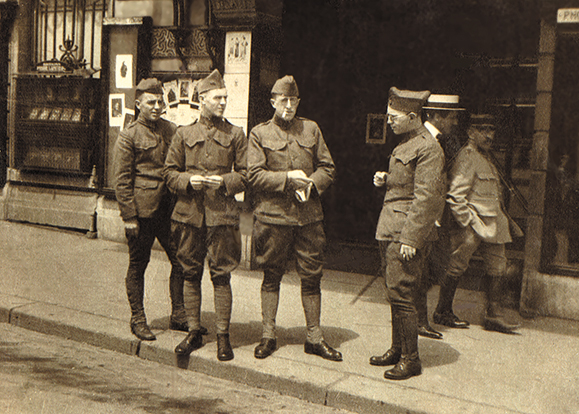Cigarette in mouth and mates by his side, Corporal James L. O’Brien stands on a street in Paris in 1918.
O’Brien and his friend, Pat Donovan (far left) joined “because we felt it was the right thing to do. Quite a few of our friends had been drafted.” Assigned to recruitment duty in Washington D.C., O’Brien and Donovan would put up their friends who came down to enlist. “At one point, we had 28 men living in our room. We used to call it The Irish Embassy. The pay of a soldier was $1 a day. Then they made you pay $6.50 a month for insurance and made you send $15 a month home. So you didn’t have much for yourself. After five months, they decided to send me to Florida. I had asked to go overseas rather than have that happen.”
Crossing the ocean on an old Italian bunker with triple decker bunks and no showers, O’Brien recalled, “There was a great big tub of water, and after you ate you’d swish your plate through the water to clean it. I don’t know why everyone didn’t get dysentery.”
While stationed in Paris, O’Brien’s job was to transport wounded soldiers to the hospital in an ambulance that operated without lights and on unlit streets. “Once the Germans came within twelve miles of Paris, the whole sky was illuminated.”
He recalled the hospitality of the Parisians: “One woman used to invite us to her house for a meal every Sunday night. After dinner, the whole family would escort us to the subway station.
O’Brien returned home to receive his master’s from Boston Teachers College and was the first guidance counselor at Dorchester High School where he stayed for 24 years alongside his buddy Pat Donovan who also became a teacher and his brother-in-law.
In 1991 the City of Boston honored him with the James O’Brien Appreciation Day. Corporal James O’Brien, my grandfather, passed away in 1993 at the age of 98. ♦
–– Quotes courtesy of Boston College Magazine, 1992


Leave a Reply